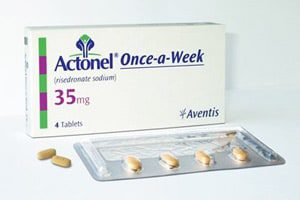
We’ve long been following risks associated with bisphosphonate (BP) drugs like Fosamax, Boniva, and Actonel, which are approved to treat bone-weakening diseases like osteoporosis and Paget’s disease. Cancer patients also often undergo therapy with Aredia, Zometa, and other bisphosphonate drugs to prevent fractures from bone metastases. In one such case, a woman treated with bisphosphonates […]
 We’ve long been following risks associated with bisphosphonate (BP) drugs like Fosamax, Boniva, and Actonel, which are approved to treat bone-weakening diseases like osteoporosis and Paget’s disease. Cancer patients also often undergo therapy with Aredia, Zometa, and other bisphosphonate drugs to prevent fractures from bone metastases.
We’ve long been following risks associated with bisphosphonate (BP) drugs like Fosamax, Boniva, and Actonel, which are approved to treat bone-weakening diseases like osteoporosis and Paget’s disease. Cancer patients also often undergo therapy with Aredia, Zometa, and other bisphosphonate drugs to prevent fractures from bone metastases.
In one such case, a woman treated with bisphosphonates when her cancer metastasized to her bones has been diagnosed with necrosis of the jaw, according to Fox News. She described that bisphosphonates were meant to act as a bone hardener to make it more difficult for the cancer to attack her bones. She noted that after undergoing monthly transfusions for two years, the U.S. Food and Drug Administration (FDA) pulled the drug over so-called “jaw death,” a serious adverse reaction.
According to Fox News, ten years after her treatment, the woman is suffering from “jaw death” in the rear quarter of her lower jaw, as well as gum recession and exposure of dead bone—osteomyelitis. She describes severe pain and an infection beneath the bone caused by the dead bone leaching the area’s blood supply. Six oral surgeons refused to treat her; antibiotics are not helping; and she is potentially facing a jaw resection, removal of some teeth and part of her jaw and implantation with a steel plate. She is hoping hyperbaric oxygen chamber therapy will help.
We previously wrote that research revealed that risks for developing osteonecrosis of the jaw (ONJ) following dental extractions raises significantly in patients taking bisphosphonates and the risks dramatically increases if the drugs were received intravenously, according to the study published in the International Journal of Oral and Maxillofacial Surgery.
We also wrote that dental extractions appear to be a major trigger for ONJ in people receiving bisphosphonates to treat multiple myeloma or Waldenstrom’s macroglobulinemia, according to an Italian study published in the Blood Cancer Journal. All of the patients involved in that study received either Zometa or Aredia.
In 2005, the U.S. Food & Drug Administration (FDA) ordered that warnings about ONJ be added to labels for Fosamax and other bisphosphonates. It is believed that osteonecrosis may develop when bisphosphonates prevent the body from repairing microscopic damage to the jawbone, such as what is seen during routine dental procedures.
Bisphosphonates like Fosamax have been associated with a number of other serious side effects. In October 2010, for example, the FDA asked the manufacturers of bisphosphonates used to treat osteoporosis, including Fosamax and Boniva, to add information to the “Warnings and Precautions” section of the drugs’ labels describing the risk of atypical thigh fractures after a study linked long-term use of such drugs to this side effect. Most recently, studies have indicated that long-term use of oral bisphosphonates may increase risks for esophageal cancer.


